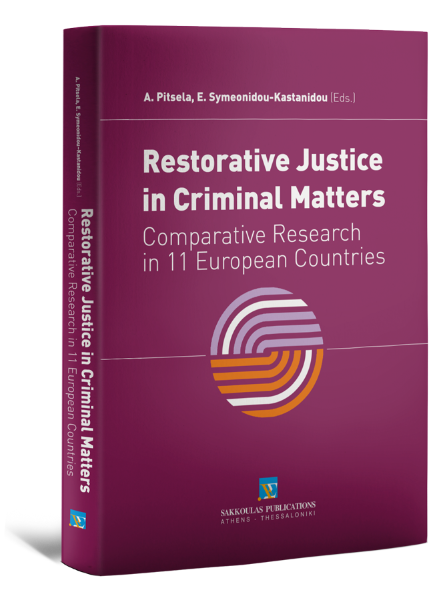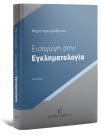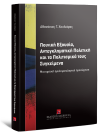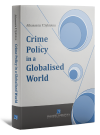D. Chankova/A. Storgaard/P. Laitinen..., Restorative Justice in Criminal Matters: Towards a new European Perspective, 2013

Under the Specific Programme Criminal Justice of the European Commission (Directorate-General Justice - Directorate B: Criminal Justice), the Department of Criminal Law and Criminology, Faculty of Law, Aristotle University of Thessaloniki, Greece had successfully submitted a relevant research proposal and took over the coordination of a research project (JUST/2010/JPEN/AG/1534) that aimed at the promotion and the further diffusion of restorative justice in Europe. The title of the project was: "The 3E Model for a restorative justice strategy in Europe" and the full subtitle: "The geographic distribution of restorative justice in 11 European Countries and the configuration of an Effective - Economic - European Strategy Model for its further diffusion".
The project was composed by two main branches, aiming at the development of a restorative justice response to crime in 11 European countries: a) a comparative study of 11 European countries from the North (Finland, Denmark), Western Central (Germany, United Kingdom, Netherlands), Eastern Central (Hungary, Poland, Bulgaria) and South Europe (Spain, Greece, Turkey), and b) a relevant project aiming at the organization of a coherent strategy, the identification and the diffusion of effective measures and procedures and the exchange of good and cost-effective practices through a flexible and easily applicable Model, for their wider adoption and their better application in Europe.
The country reports and the most useful findings of this project (i.e. the comparative research) are presented at the present book.
Edition info
Table of contents +-
Abbreviations
Preface
Angelika Pitsela & Elisavet Symeonidou-Kastanidou
Introduction
Angelika Pitsela, Elisavet Symeonidou-Kastanidou, Athanasia Antonopoulou & Charalampos Karagiannidis
PART
The Country Reports on Restorative Justice
Bulgaria, Dobrikna Chankova
Denmark, Anette Storgaard
Finland, Pirjo Laitinen & Mirva Lohiniva-Kerkelä
Germany, Andrea Păroşanu
Greece, Vasso Artinopoulou
Hungary, Ilona Görgényi & Judit Jacsó
The Netherlands, Irene Sagel-Grande
Poland, Barbara Stańdo-Kawecka & Joanna Deszyńska
Spain, Esther Giménez-Salinas i Colomer, Lara Toro i Lienas & Samantha Salsench i Linares
Turkey, Füsun Sokullu-Akinci
The United Kingdom, Theo Gavrielides
PART
Towards a new European Perspective for Restorative Justice in Criminal Matters: Comparative Analysis and Proposals
Angelika Pitsela, Elisavet Symeonidou-Kastanidou, Athanasia Antonopoulou & Charalampos Karagiannidis
1. Comparative Conclusions on Country Reports, Evaluation Tools and Key Practitioners Interviews
1.1. Overview of the traditional Criminal Procedure System
1.2. Overview of the Legal Frame of Restorative Justice
I. Restorative Justice as an overall and general scheme or fragmented and
incoherent? Through specific law provisions or in the “shadow of the law”?
II. Restorative Justice applied to any kind of Crime or to specific Categories of
Crimes?
1.3. Restorative Justice in different Stages of Criminal Proceedings
I. Restorative Justice at Police Level
II. Restorative Justice at Prosecution Level
III. Restorative Justice at Court Level
IV. Restorative Justice at Correctional and Re-integration Level
1.4. The Key Practitioners' Approach of Restorative Justice
Ι. A General Approach of Restorative Justice
II. Restorative Justice Frame of Implementation
III. On Restorative Justice Obstacles and Good Practices
1.5. The Obstacles and the Potential of Restorative Justice in the participant Countries
I. Technical, organizational or/and operational Obstacles
II. Ideological and conceptual Obstacles
2. Recommendations and Proposals
2.1. The 3E-RJ-Model
I. Strategy Suggestions
II. Definitions
III. Basic Principles and fundamental Safeguards of Restorative Justice
IV. Strategy Guidelines
2.2. The Proposal of a Directive for Restorative Justice in European Union
I. The Need for a Directive on Restorative Justice in Criminal Matters
II. Directive 2012/29/EU of the 25th of October
III.The proposed Content for a Directive on Restorative Justice in Criminal
Matters
References





















